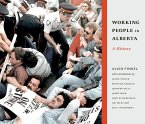Setting municipal relief administrations of the 1930s within a wider literature on welfare and urban poor relief, Strikwerda highlights the legacy on which relief policymakers relied in determining policy directions, as well as the experiences of the individuals and families who depended on relief for their survival. Focusing on three prairie cities-Edmonton, Saskatoon, and Winnipeg-Strikwerda argues that municipal officials used their power to set policy to address what they perceived to be the most serious threats to the social order stemming from the economic crisis. By analyzing the differing ways in which local relief programs treated married and single men, he also explores important gendered dynamics at work in the response of city administrators to the social and economic upheaval of the Depression. Probing the mindset of local elites struggling in extraordinary circumstances, The Wages of Relief describes the enduring impact of the policy changes made in the 1930s in the direction of a broad, national approach to unemployment-an approach that ushered in Canada's modern welfare system.
Dieser Download kann aus rechtlichen Gründen nur mit Rechnungsadresse in A, B, BG, CY, CZ, D, DK, EW, E, FIN, F, GR, HR, H, IRL, I, LT, L, LR, M, NL, PL, P, R, S, SLO, SK ausgeliefert werden.









